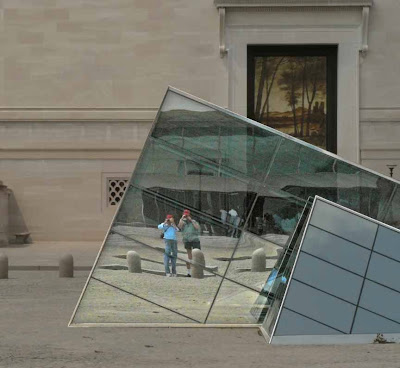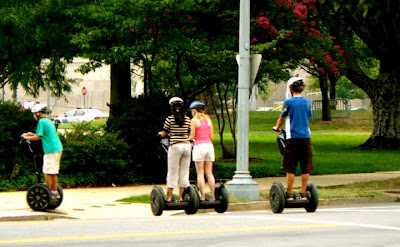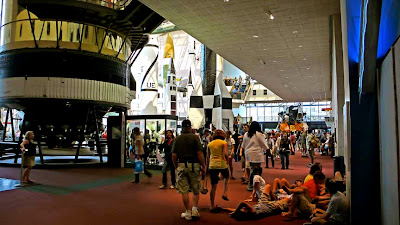David Suley drove us across town to Mt. Vernon via the parkway along the south side of the Potomac River in Virginia. The mansion and grounds, originally property of George Washington’s grandfather, have been beautifully restored. Mt. Vernon was the biggest disappointed of the trip—no photography was allowed in the house of the father of our country.
In 1759 George Washington leased the property and settled his wife Martha and her two children from a former marriage in the mansion. Between them, they owned some 100 slaves who worked the prosperous plantation. As Commander in Chief of the Continental Army, he rarely could visit his home. In 1783, he resigned his military commission and retired to Mt. Vernon. Called away again as first President of the United States from 1789-97, he visited his wife and extended family 15 times. George Washington died at Mt. Vernon in 1799 and is buried on the property, as is his wife, and others deceased on the plantation.
We attended a beautiful High Mass with glorious choir, then viewed the various chapels and works of art in the main church and underground crypt. This was our fourth visit to the Basilica: first in 1959 on our way to Africa when we saw the church under construction, 2nd in 1968 during our three month’s Greyhound Bus trip around the United States; and 3rd in our 2004 U.S. tour in the same RV to visit relatives and friends. Afterwards David Suley took us to see his office, where he is head of Home Missions, in the nearby U.S. Conference of Catholic Bishops.
As we walked down from the Subway station toward the Mall, we were captured in the glass pyramidal sculptures in front of one of the buildings of the National Gallery of Art. [We were later able to escape from the glass prism (prison).]
Did you think we would miss a well-known botanic garden—no way, José!
Sited near the Capitol, the glass conservatory and exterior gardens of the U.S. Botanic Garden are maintained to perfection. This year, many of the major botanic gardens of the U.S. had special regional displays, rather crowded, in front of the main building.
Are you expecting some portraits of flowers? You will have to wait until the next blog to get your fill—from Dupont’s Longwood Gardens in Pennsylvania.
On another day, we took the subway to the Gallery Place-Chinatown exit, Bill intending to visit the International Spy Museum. He was willing to pay the $14 senior’s entrance fee, but learning they did not allow photography, turned away in disgust.
Getting on the external “circulator” bus line, (only 50¢ each), we got off at the Mall. It was a sweltering, humid, gray day.
Then very slowly, we walked up the hill to the base of the Washington Monument. Admission to the top was already fully booked for the day, so we enjoyed the ground-level view in all directions, of the White House to the north, World War II Monuments and Lincoln Memorial to the west and the Capitol to the east.
 Lincoln Memorial and Reflecting Pool
Lincoln Memorial and Reflecting Pool with World War II Monument in Foreground
from Base of Washington Monument
This is one of the most elaborate and impressive monuments in the Washington area. The picture shows about one-third of the total monument.
We gratefully climbed on the Mall “circulator” bus to go around to the south side, Bill dropping off at the Space Museum and Jean going to the next stop for the Museum of African Arts.
Jean found herself at the main entrance to the Smithsonian Castle and the Enid A. Haupt Gardens. After a complete explore of the gardens, she had an hour left to visit the Museum of African Arts. The building is not prepossessing on the outside, merely an entry at ground level. The museum extends underground for 3 stories. Dark rooms, with exceptional ambient lighting, enhance the spacious display of ancient masks, bowls, and figures in ivory, wood and bronze. The gift shop sells baskets from Zimbabwe and Botswana, tote bags, cloth, toys and jewelry from other African countries.
After passing through security, Bill entered the Air and Space Museum swarming with people—more children than noticed elsewhere…
The ground floor is a hugh cavernous room fill with people, poster displays, hands-on space artifacts, and all sorts of “flying machines” hanging from the 40 to 50 foot ceiling. Other levels had more displays, such as history of space exploration in science fiction books, movies, and comics or the development of a self-contained spacesuit. Of course, there were videos and movies in various theaters illustrating man’s achievements in space.
One of the particularly impressive and interesting things was that for the most part these exhibits hanging from the ceiling were full size. It was hard to leave after two and a half hours with so many exhibits unexplored.
We could have spent three weeks in Washington D.C. and not have seen it all, but we were glad to head north, hoping for cooler weather and without that aching tooth.















